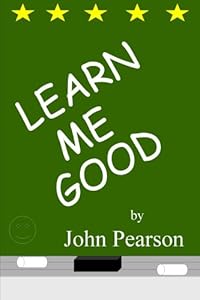
Patricia Rockwell has spent most of her life teaching.
From small liberal arts colleges to large regional research universities—and even a brief stint in a high school, her background in education is extensive.
She has taught virtually everything related to Communication—from a fine arts speech-theatre orientation to more recently a social science research approach.
Her Bachelors’ and Masters’ degrees are from the
University of Nebraska in Speech and her Ph.D. is from the
University of Arizona in Communication.
She was on the faculty at the
University of Louisiana at
Lafayette for thirteen years, retiring in 2007.
Her publications are extensive, with over 20 peer-reviewed articles in scholarly journals, several textbooks, and a research book on her major interest area of sarcasm, published by
Edwin Mellen Press.
In addition to publications, she has presented numerous papers at academic conferences and served for eight years as Editor of the
Louisiana Communication Journal.
Her research focuses primarily on several areas of communication:
deception, sarcasm, and vocal cues.
Dr. Rockwell is presently living in
Aurora, Illinois, with her husband Milt, also a retired educator.
The couple have two adult children.
SOUNDS OF
MURDER is her first novel.
Tell us about “Sounds of Murder” in a few sentences.
It’s a cozy mystery. Pamela Barnes is a Psychology professor and acoustics expert at a small southern University who discovers one of her colleagues strangled to death in the departmental computer lab. When she stumbles across a recording of the actual murder, she feels compelled to track down the killer. She does so by studying the acoustic output of the recording and attempting to identify the sounds made during the murder. Then she searches for potential killers who might have made the same sounds. Oh, and she gets in a lot of trouble along the way.
How did you come to write this particular book?
I used to be a college teacher and researcher myself—actually in the field of Communication, but much of my research involved sound. My dissertation evaluated the accuracy of acoustic technology and human coders to differentiate between liars and truthtellers based on their voices alone. I always loved mysteries and vowed to write one when I retired and had time.
If you have a favorite character in your novel, why that particular one?
Pamela is the main character and probably my favorite, most likely because she is most like me. I also have other favorites among the characters—many of them based on academic types I knew during my years of teaching. There is one sharp-tongued widow professor named Joan who is sassy, classy, and enjoys a night on the town. I rather like her.
Where and when is your novel set and why did you make these specific choices?
It is set in the present day at a small, regional university in the South in the mythical town of Reardon. I specifically don’t indicate which state, although I drop a lot of clues. I set it in a place I knew.
How can people buy your book?
It’s available in print and Kindle form at
Amazon.com.
What qualities make a successful writer?
If you just mean writer (and not bookseller which is an entirely different matter), I think persistence, organization, and the ability to brainstorm are important qualities. This may be my first novel, but it’s not my first book or published work as I have many scholarly works published. I know from experience the effort and time that goes into what may seem like something very simple. I think of many short papers that I published that I worked on for years and years. I think of the many times I started from scratch and totally reorganized many things I wrote that eventually were published.
How do you set about writing a piece?
Actually,
with “Sounds of Murder” I joined the
NaNoWriMo event, which is an annual novel writing contest that is held online each November.
Contestants are encouraged to write a novel in 30 days and the keyword is “finish” the book.
You can always polish it later, but first you have to finish it.
I found this technique to work well for me.
So well, in fact, that I tried it again the following year and completed the second book in the Pamela Barnes acoustic mystery series.
I will be writing the third such book this November.
I have it outlined and will follow my regular routine of writing a chapter a day.
Beginning writers make many mistakes: what do you think is the most harmful?
Failure to revise. I would include in that, not having someone or several someones read it and give constructive criticism. I’m lucky to have a couple good editors whose opinions I value and they read my work many, many times before I’m satisfied.
To what extent are grammar and spelling important to a writer?
As you can probably imagine, coming from a teaching background, I’m fanatical about grammar and spelling. When I’m revising and find a mistake in my own work, I’m extremely hard on myself.
How much revision of MS do you do before you send it off?
A lot. As I said, I have several editors or “readers” who are very critical and whose opinions I value. Although I don’t “send any MS off, because I have my own publishing company, that doesn’t mean that I don’t expect my own work to be polished and perfect.
To what extent do you think genre is useful in the publishing world?
I don’t know if “useful” is the word I would use. I know it exists. As a matter of fact, my own publishing company, Cozy Cat Press, was formed specifically to produce one genre of novels—the cozy mystery. We are a niche publishing company—and we make it clear to potential authors who might consider submitting their work that we are only interested in publishing cozy mysteries. As far as I know, we are the only publisher that publishes only cozies. There are quite a few publishers that publish only mysteries.
How do you know where to begin any given story?
That’s a hard one. I try to start with an exciting moment, a scary, or frightening moment that leads directly into the mystery. Most cozies are plot driven and typically fairly short so there isn’t a lot of time for elaborate character development. I have learned from my critics how important it is to start off “with a bang.”
What sort of displacement activities keep you from actually writing?
Not sure what you mean by “displacement” although I assume you mean anything that distracts me from writing when I want or need to write. Actually, it’s not much of a problem for me as I’m very organized and highly motivated, so when I intend to write—I write.
Do you have support, either from family and friends or a writing group?
My husband is super supportive. I have a writing buddy—actually a co-publisher—who is also an incredibly supportive co-writer and friend. The rest of my family and friends—not so much. I try not to let it bother me.
Is presentation of the MS as important as most agents and publishers suggest?
I can’t really answer that from the writer’s point of view as I didn’t make very many attempts with traditional publishers before I became disgusted and decided to form my own publishing company. Now that I’m a publisher and receiving submissions myself, I would say that to some extent presentation is important. However, no matter how “pretty” the book is, if it isn’t readable, it doesn’t really matter.
How long does it normally take you to write a novel?
One month. As I said, I follow the NaNoWriMo formula. I start November 1 with Chapter 1 and I end November 30 with Chapter 30—doing a chapter a day. So far, it has worked great for me.
Who or what inspires me?
Other authors—particularly cozy authors.
IF there’s a single aspect to writing that really frustrates you, what is it?
I find book marketing is FAR more difficult than book writing.
Is there any aspect of writing that you really enjoy?
It’s really like giving birth. You watch the little creature grow and develop in the womb of your mind and then it’s born onto the paper and eventually flies off a reader’s home—just like a first-grader going to school.
Do you think writing is a natural gift or an acquired skill?
I think you have to love writing (which is the gift part), but you can always work on getting better (the skill part).
What single piece of advice would you give to writers still hoping to be published?
It’s really hard. Personally, I’d find a small publisher (like Cozy Cat Press—and there are many others) where you won’t get the expensive bells and whistles, but you will get a lot of tender loving care. Or do as we did and form your own company—but, boy, that is hard. Let me tell you.
What are you writing now?
I’m just getting ready to write the third book in my Pamela Barnes series. I’ll start it November 1. I have an extremely complete outline ready and I work on revising it daily.
Do you have a website or blog that readers can visit?
Given unlimited resources, what would be your ideal writing environment?
Actually, I’m quite happy with my environment. I have a small study on the second floor of our house. My computer and two printers are there. It overlooks our living room, so I can chat with (or ignore) my hubby when he’s watching golf on TV.
Where do you actually write?
At my computer.
 An odd choice of book for a non-specialist and a fiction
writer, perhaps. But, this work has something to offer to more than the
teachers of English who are its intended readership.
An odd choice of book for a non-specialist and a fiction
writer, perhaps. But, this work has something to offer to more than the
teachers of English who are its intended readership.






























